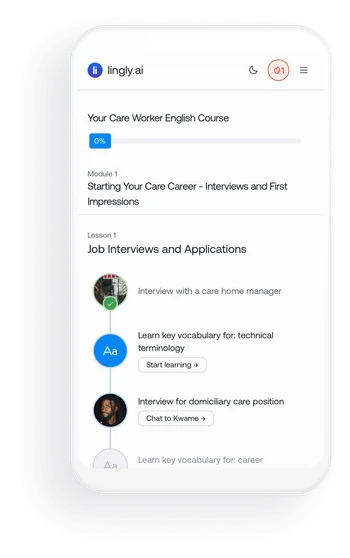Building English Confidence at a Dementia Specialist Care Home
A busy dementia nursing home in Manchester equipped 27 international care workers with practical English skills through Lingly's job-specific platform, fitting around demanding shift patterns.
- Enrolment Rate
- 96.4%
- Total Guided Learning Hours
- 200+
- Staff Approval Rating
- 100%
- Top User Daily Average
- 2h





My previous employer told me to build confidence in English, but they never showed me how. This was the first practical training I'd received.
Investing in Potential
This Manchester-based dementia nursing home employs 55 staff from India, Nigeria, and across the world, caring for 30 residents. Like most UK care homes, they rely heavily on international workers.
But unlike most, they recognised a problem the sector tends to ignore: experienced carers being held back not by ability, but by confidence.
"I would hate to have perfectly capable, hard-working staff miss out on a role because of a language barrier."
— Bernadette, Care Home Manager
The Solution: 24/7 Care-Specific English Training
Lingly partnered with the care home to build a bespoke dementia care language course, tailored specifically to their staff's daily challenges. Workers got practical, job-relevant English practice they could do anytime, anywhere: before shifts, during breaks, or at home after night shifts.
-
Practice With AI Residents Who Speak Real UK Accents
Realistic patient interactions, family conversations, and handovers with AI that speaks authentic UK dialects
-
UK Vocabulary in Context
Learn everyday British terms and care-specific language through real workplace scenarios—no more "cuppa vs copper" confusion
-
Competitive Leaderboards Drive Engagement
Gamification and friendly competition kept staff motivated to complete training—even after demanding night shifts
-
Fits Around Any Shift Pattern
15-minute daily practice sessions that work with any schedule—night shifts, split shifts, or days off

Why Traditional Solutions Don't Work for Care Homes
Traditional ESOL classes weren't designed for shift workers who need immediate, practical care communication skills.
-
Fixed schedules don't work
-
With rotating shifts, night work, and 24/7 care, staff can't commit to weekly classes at set times
-
Generic content misses the mark
-
Staff need to learn care-specific terminology and UK colloquialisms, not essay writing or textbook grammar
-
Cost and logistics
-
At £4,000-8,000 per person for workplace English, traditional ESOL is prohibitively expensive for care homes
Even after night shifts when I was tired, I wanted to stay ahead. That night I said 'I won't sleep, I have to finish the course'—and I did.
The Results: Strong Engagement, Real Learning
Enrolment Rate
Roleplay Conversations
Words Spoken
Learning Hours
Daily Average (~59 days)
Top User Daily Average
Care Notes Practised
Staff Approval
Hear From the Staff
Minu
Care Home Manager
"I've seen real transformation in our staff. One care worker had barely used English since secondary school, another home said she struggled to speak it at all. Now she's confidently speaking in full sentences with residents and their families. Staff members became completely addicted, one was messaging me constantly over the weekend because he just wanted to keep learning."

Michael
Care Worker
"My previous employer told me to build confidence, but they never showed me how. This was the first time I encountered something like that. I was at work when someone asked for a cuppa—my mind went straight to copper, the metal from Nigeria. With Lingly, I learnt it. Now when I hear these things, I know what they mean. It helps because it's the day-to-day English I actually use at work."

Awah
Care Worker
"I didn't know what 'brew' was all about. Lingly taught me it. Then I said to Margaret, 'would you care for a brew?' and she understood me. It was long, but it was worth it—I learnt new words, what to say to the residents at the right time, and how to document the activities. Sometimes we complain that it's too long, we don't have time, but it's our own course which has actually impacted me a lot, so I am grateful."

Eugene
Care Worker
"I use it daily. Even while I'm on break, I go to it. The approach I learned from Lingly helps me improve my communication with residents. I've learned so much and it has improved my confidence. The training was simplified for both higher and lower level learners, which made it accessible for everyone."

How the Care Home Transformed Staff Training
No Practical Support
Previous employers tell staff to "build confidence" without showing them how
-
"Just build confidence" without any tools or training
-
Grammar anxiety stops staff from speaking up
-
Confused by UK vocabulary like cuppa vs copper
-
No time during shifts for professional development
-
Staff avoid families due to lack of confidence
Real Transformation
Staff came out of their shell and engaged more confidently
-
Clearer documentation especially when recording witnessed incidents
-
Stronger family relationships — easier to connect, building trust
-
Better clinical handovers — articulating observations precisely to nurses
-
Local vocabulary mastered — slang and colloquialisms used with pride
-
Staff feel valued — more confident and respected in their roles
Ready to support your international care staff?
Give your team the confidence to communicate effectively with residents and families. Lingly's care-specific platform fits around any shift pattern and delivers measurable results.

